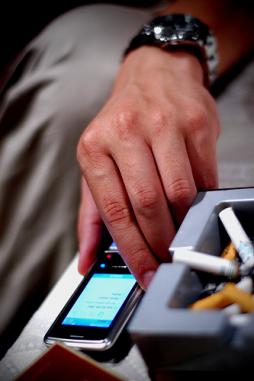Editor's note: This is a guest post by Sameer Pujari, Virginia Arnold, Vinayak Prasad, and Rahoul Ahuja from the WHO's Tobacco Free Initiative.
The global tobacco epidemic is one of the biggest public health threats the world has ever faced. According to the World Health Organization's 2011 Report on the Global Tobacco Epidemic, tobacco kills more than 6 million people per year and is expected to increase to 8 million by 2030. It is one of the major risk factors for non-communicable diseases and is a global burden not only in developed countries, but also increasingly in developing countries. According to the World Economic Forum's "The Global Burden of Non-communicable Diseases." NCDs are expected to cost the world more than $30 trillion (48% global GDP in 2010) over the next 20 years, posing a significant risk to economies worldwide.
In the last couple of years, the use of mobile phones in most countries, particularly in Asia and large parts of Africa, has seen an unprecedented increase. According to the International Telecommunication Union's (ITU) Measuring the Information Society Reports (2009 and 2011), mobile technology penetration has risen from 2% to 40% throughout much of Africa in the past decade. With more than 5.3 billion mobile phone subscriptions globally, the advantages of mobile health technology for public health, are promising because of its ubiquitous outreach.
Mobile communication can bring healthcare services and greater access to care to the developing world. According to the UN Foundation's mHealth report from 2009, 64% of all mobile phone users are in developing countries and by 2012, almost 50% of all individuals living in rural areas will have mobile phones. The international community has a unique opportunity to bring together tobacco control and mobile technology players to develop successful interventions that can be used by both developed and developing countries in their tobacco control work.
There are many opportunities to use new technology in the form of mHealth to reverse the worrying increase of tobacco use amongst people in the developed and developing world. We have good empirical evidence that directly correlates mobile technology as an effective tool for smoking cessation. According to a recent study in the Lancet that investigated the impact of SMS texts on smoking cessation, mHealth technology played a critical role in doubling the smoking cessation rate of nearly 5,000 participants over a period of six months.
Most projects on mHealth in the developing world have primarily focused on infectious diseases such as HIV, TB, and malaria. There are a few studies that have linked mHealth to tobacco control, but these are drawn from developed countries such as New Zealand, the US and the UK. The World Health Organization's tobacco control team has launched a new initiative focused on mHealth and tobacco control. The Tobacco Free Initiative is looking to work with interested governments and private/public organizations (e.g. IT and telcoms companies, academic institutions, mobile phone companies and apps developers etc.) to develop a series of cost-effective, scalable and sustainable projects that will have population-wide impacts, to help countries advance their tobacco control work. Below is a list of potential projects that the WHO TFI hopes to implement.
mSmoke-free:
- Purpose: mSmoke-free aims to help countries strengthen their smoke-free policies by reinforcing compliance and enforcement.
- Target groups: Governments, civil society, private sector and general public
- Methods: The project is based on the use of Geo Tagging (using GPS to add geographical data to various media) and will send out signals to cell phones when people enter smoke-free zones. Additionally "citizen mapping" can be used to create images of smoke free cities on the internet for people to be able to update and know about smoke-free public places.
- Impact: Reduction in the burden of direct and second-hand smoke effects and information on social norms related to tobacco use which will provide a basis for effective tobacco control interventions in the future.
mCessation:
- Purpose: The aim of mCessation is to develop a cost effective, personalized, interactive and widely accessible cessation tool using SMS and smart phone applications
- Target groups: Governments, corporate sector, general public
- Methods: mCessation tool is a structured intervention tailored to cultural, gender and age needs which will use mobile phones to send motivational messages and provide behavioural-change support in tobacco users willing to quit.
- Impact: Increase in quit rates and increase in motivation to quit
We look forward to hearing about other projecs that may assist us in investigating and developing effective programs for tabacco control worldwide using mobile technology. Please leave us a comment!
Flickr photo courtey Rashdan.


Post new comment